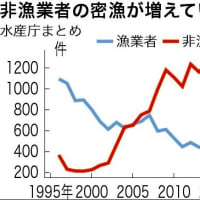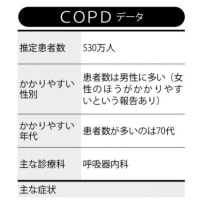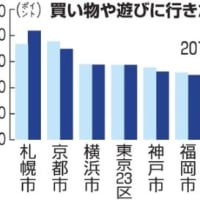プリンストン大学の経済学教授でノーベル経済学者受賞者であるポール・クルーグマンが、ニューヨーク・タイムズの連載コラムで「日本、踏み出す」というヘッドラインのもとアベノミクスを賞賛しています。
裏ブログで丁寧に分析したいところですが、ニューヨーク・タイムズは何と社説でもアベノミクスを取り上げているために、今日はそちらを優先することにしました。やさしい英語ですから、読んでみてください。本文は、798語。9分でざっくりと訳せたら、TOEIC900点です。
**********
January 13, 2013
Japan Steps Out
By PAUL KRUGMAN
For three years economic policy throughout the advanced world has been paralyzed, despite high unemployment, by a dismal orthodoxy. Every suggestion of action to create jobs has been shot down with warnings of dire consequences. If we spend more, the Very Serious People say, the bond markets will punish us. If we print more money, inflation will soar. Nothing should be done because nothing can be done, except ever harsher austerity, which will someday, somehow, be rewarded.
But now it seems that one major nation is breaking ranks — and that nation is, of all places, Japan.
This isn’t the maverick we were looking for. In Japan governments come and governments go, but nothing ever seems to change — indeed, Shinzo Abe, the new prime minister, has had the job before, and his party’s victory was widely seen as the return of the “dinosaurs” who misruled the country for decades. Furthermore, Japan, with its huge government debt and aging population, was supposed to have even less room for maneuver than other advanced countries.
But Mr. Abe returned to office pledging to end Japan’s long economic stagnation, and he has already taken steps orthodoxy says we mustn’t take. And the early indications are that it’s going pretty well.
Some background: Long before the 2008 financial crisis plunged America and Europe into a deep and prolonged economic slump, Japan held a dress rehearsal in the economics of stagnation. When a burst stock and real estate bubble pushed Japan into recession, the policy response was too little, too late and too inconsistent.
To be sure, there was a lot of spending on public works, but the government, worried about debt, always pulled back before a solid recovery could get established, and by the late 1990s persistent deflation was already entrenched. In the early 2000s the Bank of Japan, the counterpart of the Federal Reserve, tried to fight deflation by printing a lot of money. But it, too, pulled back at the first hint of improvement, and the deflation never went away.
That said, Japan never had the kind of employment and human disaster we’ve experienced since 2008. Indeed, our policy response has been so inadequate that I’ve suggested that American economists who used to be very harsh in their condemnations of Japanese policy, a group that includes Ben Bernanke and, well, me, visit Tokyo to apologize to the emperor. We have, after all, done even worse.
And there’s another lesson in Japan’s experience: While getting out of a prolonged slump turns out to be very difficult, that’s mainly because it’s hard getting policy makers to accept the need for bold action. That is, the problem is mainly political and intellectual, rather than strictly economic. For the risks of action are much smaller than the Very Serious People want you to believe.
Consider, in particular, the alleged dangers of debt and deficits. Here in America, we are constantly warned that we must slash spending now now now or we’ll turn into Greece, Greece I tell you. But Greece, a country without a currency, doesn’t look much like the United States; surely Japan offers a more relevant model. And while doomsayers keep predicting a fiscal crisis in Japan, hyping each uptick in interest rates as a sign of the imminent apocalypse, it keeps not happening: Japan’s government can still borrow long term at a rate of less than 1 percent.
Enter Mr. Abe, who has been pressuring the Bank of Japan into seeking higher inflation — in effect, helping to inflate away part of the government’s debt — and has also just announced a large new program of fiscal stimulus. How have the market gods responded?
The answer is, it’s all good. Market measures of expected inflation, which were negative not long ago — the market was expecting deflation to continue — have now moved well into positive territory. But government borrowing costs have hardly changed at all; given the prospect of moderate inflation, this means that Japan’s fiscal outlook has actually improved sharply. True, the foreign-exchange value of the yen has fallen considerably — but that’s actually very good news, and Japanese exporters are cheering.
In short, Mr. Abe has thumbed his nose at orthodoxy, with excellent results.
Now, people who know something about Japanese politics warn me not to think of Mr. Abe as a good guy. His foreign policy, they tell me, is very bad, and his support for stimulus may have more to do with old-fashioned pork-barrel (tofu barrel?) politics than with a sophisticated rejection of conventional wisdom.
But none of that may matter. Whatever his motives, Mr. Abe is breaking with a bad orthodoxy. And if he succeeds, something remarkable may be about to happen: Japan, which pioneered the economics of stagnation, may also end up showing the rest of us the way out.
**********
「とても真面目な人々(Very Serious People)」が非難する大幅な量的緩和を実施することで、緩やかなインフレを起こすことこそが、クルーグマン教授が長年持論として主張してきたこと。アベノミクスは、その教授のアイデアをもとにしたものですから、褒めて当然ではあります。
しかし、皮肉屋のクルーグマン教授からここまで褒められれば、安倍氏もうれしくてたまらないでしょう。結論は、この部分。
In short, Mr. Abe has thumbed his nose at orthodoxy, with excellent results.
ひと言で言えば、安倍氏は正統的なやり方をバカにしたのである。しかも優秀な結果を出すことで。
安倍氏の外交姿勢も、自民党の古いやり方も問題なしだと言います。なぜなら、“Whatever his motives, Mr. Abe is breaking with a bad orthodoxy.”(氏の動機がいかなるものであれ、安倍氏は悪い正統的なやり方を打破しようとしている)から。
こうなれば、安倍氏にはぜひとも経済運営を成功させて、日本のやり方を批判してきたアメリカの経済学者たちをギャフンと言わせて欲しいものです。ちなみに、教授自身もこう言っているのです。
Indeed, our policy response has been so inadequate that I’ve suggested that American economists who used to be very harsh in their condemnations of Japanese policy, a group that includes Ben Bernanke and, well, me, visit Tokyo to apologize to the emperor. We have, after all, done even worse.
もちろん、われわれの政策に対する反応はとても不十分なものであったので、私は次のような提案をした。かつて日本の経済政策を非難する祭にとてもきつい態度であったアメリカの経済学者たちは、その中にはベン・バーナンキや残念なながら私も入るのだが、東京を訪れて、天皇に謝罪しようではないかと。われわれは、結局のところ、日本よりもはるかに悪いことをしてしまったのだから。

























※コメント投稿者のブログIDはブログ作成者のみに通知されます